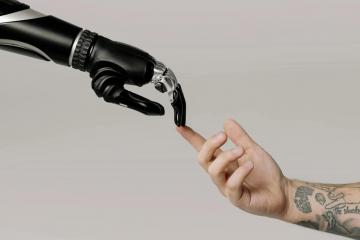Oxford University experts warn of AI's impact on human creativity
They worry that the reliance on AI may hinder the development of critical thinking skills and original thought. Additionally, there is a fear that AI could limit the diversity and depth of creative outputs. The experts suggest that it is important to strike a balance between utilizing AI for productivity and preserving the essence of human creativity. They emphasize the need for continued research and discussion on this topic to ensure a positive and sustainable future for creativity.

Dr Caroline Emmer De Albuquerque Green, director of research at the Oxford Institute for Ethics in AI, and Chris Morrison, head of copyright and licensing at the Bodleian Libraries, have highlighted both the opportunities and risks AI presents to human creators. They said the UK is well-positioned to lead in AI development, but warned the technology could threaten the livelihoods of creators if not properly regulated.
Challenges and Concerns
The rapid rise of generative AI, capable of producing text, images, video, and code, has sparked anxiety among creators and the public, they said, leading to concerns about the future of human creativity. Dr Green and Mr Morrison said: "While ‘AI-innovation’ and ‘AI-governance’ can often be pitted against each other in current political narratives, workable legal and ethical frameworks will help leverage the benefits of AI for human creativity and vice versa as well as building public trust."
Government Consultation and Criticism
The government recently held a public consultation on proposals to amend existing copyright legislation to encourage AI innovation. However, these proposals were met with widespread criticism from the creative industries. Dr Green and Mr Morrison said: "The government’s proposals force respondents into two opposing views, essentially creating an unnecessary division between the AI and the creative industries. This also comes at the expense of key stakeholders, like researchers and civil society, whose voices matter too."
Questionable Focus and Suggestions
They criticized the government's focus on the impact of copyright on the creative industries and AI sectors, which they said reinforces a divisive "copyright wars" narrative. They continued: "This does not take into consideration that licensing of copyright works is a well-established route for many AI companies and that collaboration is taking place across many sectors – including with universities and their libraries."
The experts also questioned the government's proposed ‘opt-out model’, which would require creators to indicate if they do not want their work used for training commercial generative AI models. They said: "Given the widespread concern about generative AI, it seems likely that most professional creators would choose to opt out of this provision, making implementation of this solution an expensive exercise with little benefit."
Call for Inclusive Frameworks
Instead, they called for the development of legal and ethical frameworks that move away from binary approaches, which treat AI innovation and human creativity as competing forces. They suggested a more "inclusive, deliberative" process, which considers the collective needs of creators, technologists, policymakers, researchers, and the wider public. They said: "As AI continues to evolve, shaping the future of creativity, governance must keep pace by fostering a legal and ethical landscape that supports both technological advancement and human ingenuity."

